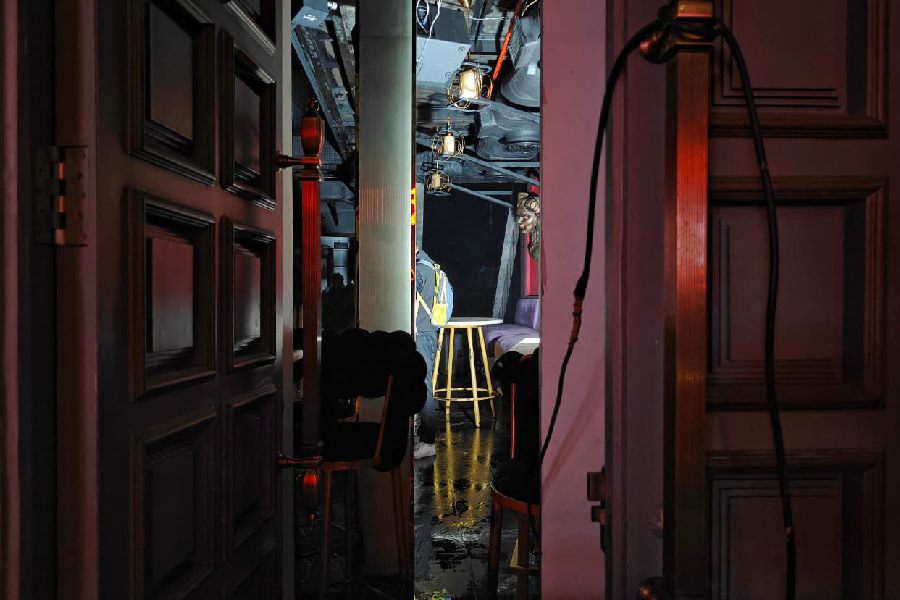 |
We’re sitting at the poolside café in Jaipur’s Diggi Palace Hotel, taking a few minutes out from the proceedings at the Jaipur Literature Festival to indulge in an aromatic serving of Darjeeling tea. And author Rana Dasgupta is talking about Bulgaria.
“If you ever take the bus from Istanbul to Sofia, just look out the window and see how you make the crossing from developed Asia to third world Europe,” he muses, his deep-set eyes set on an imaginary horizon far away. “It’s so ironic. You just have to see it to believe it.”
Dasgupta continues to talk about Bulgaria, with the poise and articulation of a master storyteller. I, of course, can’t tell beyond the name of its capital, so I quietly sit and listen. About its progressive decline from a prosperous nation to a country of garbage scroungers, its wasted landscapes, its squandered fortunes, its nostalgic moorings. It’s all immensely fascinating, I must admit, and I must say I can’t wait for the calendar to race ahead to February 20. For that’s when Solo, Dasgupta’s second literary effort, hits the shelves. Needless to say, it’s set in Bulgaria.
“It’s ostensibly the story of a man who happens to live 100 years,” Dasgupta informs me in a way a blurb on a book jacket would. “Through his life, he fails in pretty much everything he does, thus becoming a metaphor of his own country, an emblem of a century, and the icon of a Europhile generation that’s destroyed by an excess of Europe.” It sounds like a story of doom, a romantic eulogy to what could have been the greatest success story of the last century.
I can’t help but ask him why he chose Bulgaria as the backdrop for his book. A faint smile breaks out on Dasgupta’s pensive face. “I guess I’ll be asked that many times in the near future,” the soft-spoken 38-year-old says, his lean, frail figure quickly changing posture from “languid” to “thoughtful.” “So let’s try and find an answer.”
Apparently, Bulgaria made a permanent impression on his mind ever since discs punched with Bulgarian music started circulating in the UK — where the British Asian spent his childhood — in the early 1990s. Trained in Western classical music and the piano, those strains were his “first conscious introduction” to the country, and they were to soon lay the path for a more serious love affair with Bulgaria and its ways. “I went there twice, and had the most amazing experience collecting stories about the place. The people were extraordinary — a history professor would routinely take me for walks around Sofia every morning and tell me about the place, its people, its history. It’s all there in the book,” he muses.
Clearly, Dasgupta is a romantic. In the way he thinks, writes, lives. Born to an expatriate Bengali father and a British mother, he grew up in Cambridge and went on to study literature at Balliol College, Oxford. Despite wanting to be a writer since the beginning of his living memory, he oddly took up a job in marketing and public relations after he’d completed his studies. “There was a lot of money, and it had its own challenges,” he reasons about his initial career decision. “In retrospect, after I had decided to become a writer, it gave me enough money to survive for a couple of years on my own.”
It was sometime around the turn of the new century, when he’d just about stepped into his thirties, that Dasgupta felt the need to bail out of the corporate jumble. “There sometimes comes a point when you realise that what you’re doing may not be true to itself,” he says, looking back. “The corporate world was anyway a huge expense of energy, and amid it all I suddenly felt the urge to create my own body of work, something that I would be responsible for.” In other words, he had just found his calling.
So he walked out of his offices in New York one fine day in 2000 — he had moved to the US after a pit stop in Malaysia in the meanwhile — to pitch tent in Delhi. It wasn’t really homecoming. Dasgupta — who never spent time in India in the past — insists he just happens to be a person of Indian origin on a British passport currently living in Delhi. In fact, he says he’s a trifle irritated every time someone tries to draw logical conclusions from his surname. “I’m really a foreigner in India, although I must say that having lived here for eight years Delhi is now very much my reality,” he says.
But why did he move in the first place, I ask him. “Well, I was in love, and the woman happened to live in Delhi,” he smiles. “Besides, New York was making me slip into a sense of self-contentment. Delhi, on the other hand, brought me back into a situation where nothing was fixed, where uncertainty and insecurity were the norm. It was the kind of an environment suited for my writing.”
The sense of displacement, alienation and anxiety that Dasgupta felt in those early years in Delhi all went into shaping his critically-acclaimed literary debut Tokyo Cancelled. Published in 2005, the bestseller was a Borges-like journey into the modern subconscious, a confluence of narratives that summed up the human condition of the 21st century, through “modern folk tales” of insomniac billionaires, cataloguers of memories and the magical transforming powers of a box of Oreo cookies. Translated into nine languages, the book was shortlisted for the 2005 John Llewellyn Rhys Prize.
The initial success was also perhaps the turning point in Dasgupta’s life, a critical juncture where he decided to pursue writing as a full-time assignment in life. “Solo was actually a full-time job. It was tough,” Dasgupta grins. “You see, the decision to do nothing else but write largely depends on your financial stability. And while it’s nice to imagine yourself as a full-time author, the going does get difficult at times.” In fact, Dasgupta admits that during his initial writing years there were occasions when he had to go back to the corporate world to do short stints, if only for the money. “But somewhere, you just have to get focused, narrow down on your true objective and work steadily towards it.”
Of course, that would mean ceaselessly writing one book after another, which is what Dasgupta is indeed back to doing these days. With Solo out of his way, the author says he’s currently researching for his next project, a journalistic account of the city that he, along with his wife and daughter, now calls home. “It’s high time now, for me to report on the reality that I live in.”
In a distinct departure from his literary technique, this would also be his first major attempt at non-fiction. A “strategic reader,” he’s spent several months reading up on historical accounts and critical opinions shared by masters on Delhi, apart from extensively researching on the ground. “I’m considering V.S. Naipaul as my model for this book,” he says.
I’m tempted to ask more about the book, but from the corner of my eye I can see a train of journalists and fans waiting restlessly around us, to claim their share of time with Dasgupta. Clearly, the man is in demand. And that’s how he’ll predictably be for sometime, going by the anticipation building up for the launch of his book. Some may find it premature, but critics have already started billing it as Man Booker material.
But the author himself remains unfazed. “The next few months will be hectic, the launches, the author tours, you know,” he says matter of factly. Obviously, that won’t leave him with much time to travel, one of his favourite activities, or tap away at the piano.
But then, Dasgupta is not complaining. It’s time for him to reap the fruits of hard labour. Solo.











